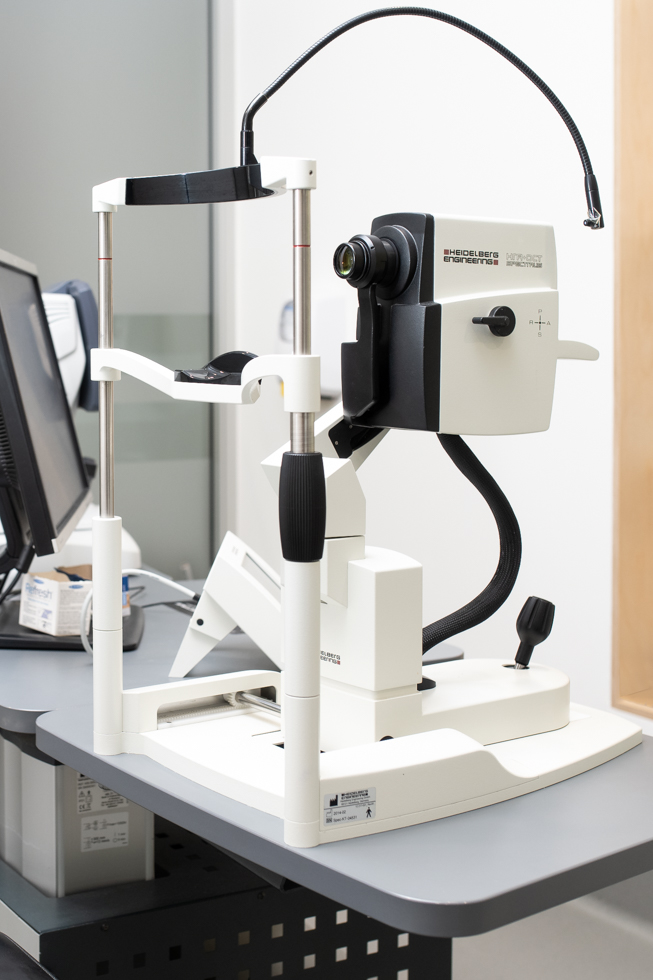Intravitreal Injections
This is the most common procedure we perform. Regular (1-4 monthly) injections can be a highly effective treatment for many eye conditions including wet macular degeneration, diabetic macular oedema and retinal vein occlusion. The most common types of injection are Anti-VEGF medications (Eylea, Lucentis) and Steroids (Ozurdex, Triamcinolone).
The eye is anaesthetised by using eye drops and an injection under the conjunctiva. The medication is then introduced to the eye painlessly. Occasionally the eye will be gritty for a day or two after, but will settle with lubricating drops. All injections are undertaken in the clinic rooms and do not require hospital admission.
Injections are usually very well tolerated but, like all procedures, do come with some slight risks. Very occasionally people will experience infection, retinal detachment, vitreous haemorrhage or a cataract.
Macular Hole Surgery
A hole can develop in the central part of the retina, known as the macula. This results in loss of central vision which affects reading and other fine tasks. Vitrectomy surgery, and the placement of a gas bubble, can repair macular holes in 90-95% of cases. Vision usually improves markedly but may not return to 100%. Usually it takes 3-6 months for maximum vision to return as the macula slowly heals.

Epiretinal Membrane Surgery
An epiretinal membrane is a fibrous growth on the macula which occurs commonly as people age. Most don’t require surgery, but some become thick and distort the macula, causing blurred and distorted vision (for example, straight lines may have a bend in them).
When this occurs, we may need to remove the vitreous gel (vitrectomy) and then remove the membrane (membrane peeling). This is a common retinal procedure and takes about 30 minutes of surgery under a local anaesthetic with sedation. Surgery will resolve the distortion in most cases and improve the person’s vision, but often their vision does not completely return to normal. Like macular holes, it usually takes 3-6 months for maximum vision to return as the macula slowly heals.
Laser for retinal tears
The gel (vitreous) in the eye liquifies as people age. At some time in life, usually in the 50s or 60s, the vitreous will separate from the retina and often cause flashes of light in the vision, and spots (floaters). When this occurs, a retinal examination is required to ensure that a retinal tear has not developed. If a tear is noted, it may require a laser to prevent fluid entering the space under the retina (which can lead to retinal detachment). This laser procedure significantly reduces the risk of a retinal detachment and is performed in the clinic rooms with only drops required for anaesthesia.

Retinal Detachment Surgery
The retina can detach from the outer retinal layers of the eye, usually spontaneously. It occurs in about 1 in every 10,000 people. The symptoms are often flashes/floaters and blurred vision. A retinal detachment will result in significant loss of vision if untreated. Retinal detachments are usually repaired by removing the gel (vitrectomy) and flattening the retina. Then applying laser or cryotherapy to the retinal break, and then filling the eye with a gas bubble to allow the retina to heal in place.
A small proportion of people require a different technique, where a silicone buckle is placed around the eye and the detachment repaired via an external approach. If surgery happens urgently, before the macula is involved, visual outcomes are very good. If the macula has detached, visual outcomes become more variable.
About 90% of retinal detachments can be repaired with one operation. 10% require multiple surgeries.
Vitrectomy for floaters
Floaters (in the vision) are very common as people age. A careful examination is needed to ensure there has not been a tear or retinal detachment at the time the floaters have commenced. If the retina is intact, then usually time (and reassurance) is all that is needed.
Occasionally floaters can be persistent and troubling for months, or even years, interfering with a person’s ability to read or drive safely. If this is the case, vitrectomy surgery to remove the floaters may be required.
Meet our team
At MBL Eye Surgeons our aim is to ensure that high quality eye care is available to our local community, as well as patients coming from further afield. We are a collaborative group of specialists, focused on achieving the best outcomes for our patients. Offering extensive clinical expertise, clear and helpful communication, and affordable, compassionate care for all.
Affiliated Health Organisations



